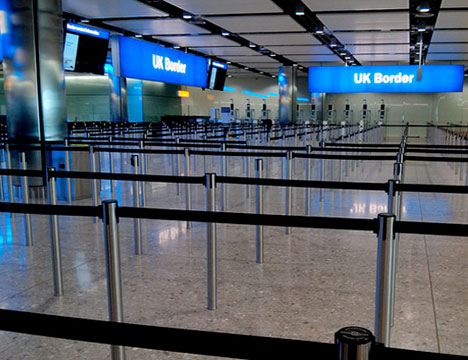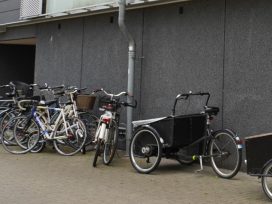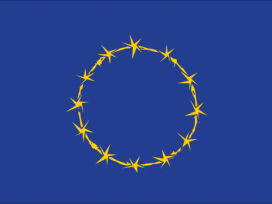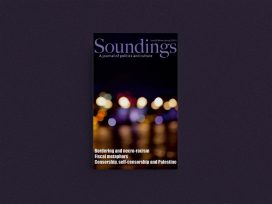State borders hold a place in the collective imagination of our times in which anxiety plays a central part. It is at borders that the mundane certainties of life dissolve and the simple business of existing becomes a matter of uncertainty. This is the place where a person is forced to confront with the sharpest of intensity the fact that the rights which usually seem as securely available as an intimate personal possession are in fact a by-product of their relationship with the authorities of a state. It is at the border that this relationship can be called into most fundamental question. “I see you are in possession of a British passport madam”, says the immigration officer. “But can you explain to me how you came by this document and why you feel you are entitled to benefit from it?”

Photo: Martin Deutsch. Source: Flickr
This is a disconcerting question that few of us would feel confident of answering (certainly without detailed knowledge of the provisions of the British Nationality Act 1981). Most of us are in the happy position of being unlikely to be pushed too far on the matter. But some are not. For example, one young man I assisted with legal advice told me of his anxious hours at Heathrow airport when his claim that he was British-born, if not raised, was treated with deep scepticism. He had been born in Britain, but when he was six years old his Guyanese parents had taken him to their home country after a decade of life in London. Now returning to study at university, his case was only resolved after his lawyer intervened with additional evidence of his personal circumstances.
But if a British citizen can be subjected to this level of stress, how much greater are the anxiety levels for a Filipina nurse questioned about a visa that is probably incomprehensible to her – supplied by an agent back in Manila, who has assured her that it entitles her to come to the UK to accept the offer of a job as a nurse. It is entirely possible that all the deals that have been done – the form-filling, the gathering of supporting documents, the photographing, the English testing, the finger-print taking, and the payment of often very considerable fees, will be picked apart by an assiduous official who routinely finds grounds for doubting that a young woman from northern Santa Teresita could ever have been awarded a degree in health care from the country’s prestigious De La Salle University.
At a border you can be mentally stripped naked through rigorous interrogation, before being taken to a small room where you are physically stripped. Diaries will be read and hard drives on laptops scrutinized; while the letter from your cousin offering you a sofa to doss on until you sort out your own place will be the subject of excited interest, in case it reveals a snippet or two about why you are “really” here. When things go wrong for you at a border you lose the right to tell your own story of your life. You see another you being assembled before your very eyes, through which you are presented as a monster of conniving malevolence, capable of any deceit in your efforts to lay your hands on something to which you have no entitlement. The worst thing is that you are invited at each stage to follow the logic of this deconstruction of yourself. By the end you may find yourself morbidly agreeing that, “yes, I can see how you would believe that of me …”.
In short, a border is a place where most of us don’t want to be for any longer than the time it takes to clear the queues at immigration control, pick up your luggage and board the bus to the centre of town. As the border gets further behind you with each passing minute, you return to a world which may have its everyday worries and concerns, but in which there is at least the assurance that, in normal, mundane intercourse, the default presumption is that you are who you say you are.
But nowadays, for increasing numbers of people, this is not what happens. The border is no longer something to be negotiated on the relatively few occasions in life when we make a conscious decision to approach it and hazard all its dangers. Those disconcerting immigration officials are now being given leave to absent themselves from passport checking duties: they are being sent off in minibuses to ply their trade in many of the places where ordinary folk need to go as part of their daily lives. People may now be asked to verify their immigration status when they apply for atenancy, or to university, or for child support, or even at the tube station.
This insidious extension of border enforcement has been experienced for decades by people in the extended networks of self-help and legal advice that workso hard to protect and even extend the scope for exercising the rights available to people from migrant communities. They have witnessed the ways in which border enforcement has gradually slipped away from physical state borders, to root itself into the everyday existence of people as they negotiate their way around state and quasi-state institutions and agencies in their local communities. They have seen how the shadow of the border looms over whole territories and environments; there is no question here of an “intelligence-led” smart missile that locks itself solely onto the DNA of individuals who have broken immigration rules. All are affected, but the shadow falls with most serious consequences on people whose contact withthe agencies of the state is most frequent – people who stagger along on insecure employment and in order to get by need additional support from social housing and other benefits; families whose children have fallen under the purview of social service departments; or the frail of health who come under scrutiny at the GP surgery and the local hospital. People in these circumstances must constantly prove the legitimacy of their claims as citizens or residents if they are to receive the support to which they are entitled.
Bordering and the erosion of trust
The Borderscapes research project has argued that we should understand borders as the product of an active political and social process of “bordering”, which is present in the lines which people must cross as they move between the realms of the private and the public, or as they move through the terrains in which civil society is obliged to enact its accountability to the state. These bordering processes “begin to crystallize into semi-permanent, formal institutions”, in which there is never a final end insight. The border is never safely crossed once and for all.
Bordering operates at all levels: from the grand-scale geopolitical bordering that expresses the changing balance of power between states; to the reconfiguration of state administrative procedures at the behest of economic and technological imperatives; to the micro-level of practical experience of the border as it impacts on everyday lives.
Across the decades over which immigration control policies have evolved, this process of bordering has wrapped itself around the lives of migrants. And its scope has widened dramatically in recent times, as people have increasingly moved across traditional physical borders, under the impact of globalization and the integration of adjacent national economies into single markets. Across the world, political life is increasingly consumed with the dilemmas of managing the movement of people– which is in accordance with the logic of economic development, but nonetheless deplored by the political authorities.
This bordering activity opposes itself to what many of us hoped would be the reinforcement of the spontaneous conviviality of life in a modern global city, asa natural corollary of years of life in close proximity between people of different national and ethnic backgrounds; this conviviality is strongly linked to a sense of acommonality of interests, and deeply entwined in the agreements people reach onthe sharing of public goods, benefits and services. Working out these agreements requires that people see each other as being at least approximately equal to oneanother: it implies that any arguments for priority of treatment for individuals orgroups will be kept at the level of a clear, objective justification. Within diverse communities this certainly excludes special pleas for greater entitlement basedon ethnicity – or on other grounds that in reality are acting as a synonym. The assurance that a high level of protection from unjustified discrimination is available to all people is part of an evolving cultural agreement as to what is required for the securing of social justice across the range of social interactions that take place infast-paced, complex urban environments. It is a critical component of what RichardSennett has described as the sort of spontaneous, street-level respect which needs to be generated between the countless individuals in modern societies who interact with one another in the guise of strangers on a daily and even hourly basis.
Processes of bordering threaten to disrupt the consensus needed to hold together the mesh of implicit agreements that sustain an intuitive sense of social justice between the communities of strangers who make up the modern diverse city. They do this by generating new legal obligations for individuals whose work involves them in the administration of the offer of a social good – such as a job, a tenancy agreement, access to the services of a GP, a place on a course at a college or university, or a social security benefit; many people in such positions are now required to grant such access only on condition that they have checked the immigration status of the individual concerned. There is a price to be paid for not carrying out this duty to check immigration status, and for many it can be cripplingly severe. By these means the more-or-less organic relationships that exist between individuals who are presumed to be equal are now being mediated by a control system that connects a vast range of interactions with the agencies of state control. Bordering becomes embedded in local community life. And the groups thatas a result are every day coming under the sway of border control extend far beyond people labelled with the socially constructed identity of “illegal immigrant”. One result of these processes is a decline in trust and weakening of social bonds.
Life at the border
What do borders mean to the people who follow the migratory logic of “gettingon your bike” to find opportunities for a better life? One of the partners in the Borderscapes project, the Centre for Research on Migration, Refugees and Belonging (CMRB) at the University of East London, has undertaken work to answer this question, in a collaboration with a number of long-established immigrant and black community organizations that have been mapping the new configuration of bordersand the threats they pose to the security of people of migrant backgrounds. Theresults can be seen in a documentary film made by Orson Nava which is availableto view online. The film explores the ways in which bordering increasesthe insecurities about their place in British society that are experienced by migrantand ethnic minority people; it looks at their experiences as students, owners of small businesses, or women at risk of domestic violence; the difficulties people experience in finding decent housing and healthcare; and their relations with the police and immigration enforcement authorities. In doing so it makes the argument that thebusiness of creating “victims” now extends far beyond the immediate target group of migrants with irregular residence status, to take in much wider swathes of members of “legal” civil society.
Since 2006, when the New Labour government beefed up previously moribund legislation, employers have lived with the threat of “civil penalties” if they inadvertently or otherwise employ someone without the perquisite documentation; these are fines that can be directly imposed by government officials, without the necessity of a court order, and until recently ranged from 5000 to 10,000 pounds per undocumented worker in the employment of their establishment. A further ratcheting up of the penalty for engaging an immigrant whose papers aren’t in order was brought in through the provisions of the Coalition government’s Immigration Act 2014, when the amount that could be extracted from an employer rose to 20,000 pounds per worker.
The implementation of these measures has led to increased activity on the part of immigration officials, who operate in bands currently designated as ICE (Immigration Compliance and Enforcement) teams, and carry out raids on the premises of workplaces suspected of engaging undocumented migrants. Typical targets of such raids are the premises of Bangladeshi businesses operating in food and catering, an industry built by an earlier generation of immigrants who traded on their networks and community-specific skills. High-street based ethnic minority enterprises are regarded by the ICE teams as low-hanging fruit – always there to be picked whenever their political bosses demand “results” in the form of enforcement actions that lead to deportations. During one period, when the Home Office ran a webpage intended to “name and shame” business made subject to civil penalties, it was possible to observe on the basis of the names of the alleged malefactors that something in the region of between 60 and 70 per cent of all raids were directed against minority ethnic-owned concerns. Many firms have been put out of business by the heavy financial penalties that have been imposed on them.
This aspect of the policing of migrant workers adds a layer of complexity to issues that are often seen in distinctly un-nuanced terms. Defenders of immigration raids – as likely to be found in the ranks of Labour politicians as amongst those of the right – often associate the owners of targeted premises with low pay and exploitation, and therefore regard them as unworthy of the sympathy of ordinary citizens. This is to overlook the fact that such businesses have usually been built up by black and Asian people obliged to look for opportunities in the narrow spaces left to them by a white majority society – which has found numerous ways of inhibiting participation in the enterprises which it considers mainstream and acceptable. Historically they have worked in a niche in which eighteen-hour days are common, with the proprietor putting in the longest time and relying on the donated labour of family members to make ends meet. The casual engagement of additional workers, often students or casual acquaintances from their own ethnic groups, and administrative practices that have often been poor on record-keeping, has made such workplaces vulnerable to the charge of having “illegals” present in the business. Far from accepting the notion of “shame” for having failed to abide by the standard imposed by state agencies which seem require ultra-efficient standards of bureaucracy from hard-pressed family concerns, proprietors subjected to these raids are much more likely to experience an intensified feeling of injustice.
Higher education is another sector that has become the site of border policing– even though its viability increasingly now depends on income from international students. The service it offers produces income for the national economy at an estimated rate of 12 billion pounds a year, in terms of the fees paid by UK-resident foreign nationals, together with the additional value they bring to local economies. Student admissions officers now have to contend with a paraphernalia of immigration compliance when registering young people who want to attend their higher education institutions. This includes the collection of biometric data, to go on Home Office records and show up on the identity cards that each student is required to have with them at all times, and all the rigmarole of “credibility interviews” for people moving between courses in the UK. This has begun to pollute the collegial relationships which are supposed to exist in the academy. Students of non-UK origin feel obliged to carry passports and identity cards wherever they go.
Another business sector that is affected by everyday bordering is that of private rented accommodation. The provisions of the Immigration Act 2014 imposes arequirement on landlords to check the immigration status of prospective tenants. A failure to get it right and to be found to be letting accommodation to a person with an irregular status entails a civil penalty of 3000 pounds. The task of establishing how this obligation could be made effective in practical terms has been trialled in the West Midlands since November 2014, and has encountered very considerable difficulties. One issue is that landlords don’t usually understand immigration law, and many of them approach the question with attitudes based on prejudices about non-British people – a category which is often understood as including all non-whites. They regard most such aspiring tenants as potentially illegal. The prospect of being fined for getting it wrong is likely to make many accommodation providers risk-adverse, and to tend towards excluding anyone who seems “dodgy” or potentially so. In local housing markets with high levels of demand for accommodation, the easiest course of action is likely to be to offer tenancy agreements to those in the queue who can oblige by showing irrefutable evidence of British status. As a result the sense that injustices are routinely taking place takes ever deeper root.
There is also concern that there has been a loss of capacity to right some of the wrongs in our society that are of far greater magnitude than any damage done by so-called illegal migration. These new policing measures are creating real problems for those involved in identifying and rescuing people who have been the victims of people trafficking. A society which enrols every citizen to act as an untrained immigration officer might be bringing people whose immigration papers aren’t in order into the limelight, but they are also far less likely to be able to address the more difficult issues of finding out which of these people ought properly to be regarded as victims of heinous crimes.
As evidence from the charity Doctors of the World has shown, many people needing healthcare have also been excluded from public health services because of their immigration status, across the rest of Europe as well as the UK). Not only does this represent a danger to their own health and safety; it also means that many people are suffering from injuries and illnesses that are likely at some point to lead to urgent referrals to A&E departments.
All this has led to a general chilling of relationships between migrants and BME communities and the police, across a range of matters where close liaison would be a better outcome for all. There is a noticeable reduction in the willingness of people to report a crime or offer themselves as witnesses: they feel that such actions are likely to lead to scrutiny of their residence status.
Unsurprisingly, there is evidence of growing resistance to bordering amongst the migrant and BME communities on which it has is greatest impact. Everyday Borders features vivid images of street confrontations between Asian women in West London and officials of an ICE team attempting to check the immigration status of people entering a tube station. This militancy was provoked by awareness that their community included many women whose lives and immigration status had been made precarious by their experience of domestic violence; and not only was the state not offering protection for such women; it was also greatly increasing their fears and anxieties because of the threat of being stopped and checked on the street or at the tube entrance.
One current of social-democratic opinion urges us not to get so het-up about borders. If we want regulated, well-ordered societies capable of generating welfare for the well-behaved, the price that has to be paid is a thickly-drawn black line separating those who can be considered to be insiders who contribute to the system from those who don’t. The proponents of these views draw extensively on arguments about the necessity for social trust as the cement that binds society together. They argue that this can only be secured through the sense of a shared history that stretches across generations, and which is inevitably absent when it comes to relating to migrants and other newcomers.
But trust is sustained in many ways and by many different actions. It does not require the span of generations to be become a factor in life, and can emerge inrelatively short periods – whenever people feel that that their neighbourhoods afford a good degree of personal security and that the principles of social justice are shared across the local population. And it is precisely this hope that trust between diverse groups of people can be readily established that is being sacrificed by the current state imperative to create borders between people – borders that can only be surmounted through the normative proscriptions of identity checks and immigration control. Meanwhile the government is threatening a new immigration bill that will go even further in generating the hostile environment in our local communities that it regards as necessary to control immigration. We need to decide pretty quickly who is most likely to be right on this pressingly important issue – before the damage inflicted by bordering moves us beyond the hope of recovery.








